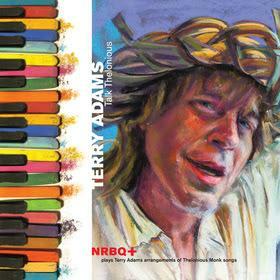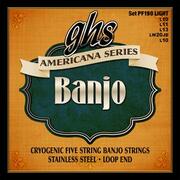New York, NY (Top40 Charts) Pianist/founder of NRBQ Terry Adams chose to take a long and winding path to the recording of Talk Thelonious: NRBQ+ plays Terry Adams arrangements of Thelonious Monk Songs, his new album of compositions by jazz legend Thelonious Monk to be released on November 27, 2015 as a two-LP set on Euclid Records and a CD on Clang! via Burnside Distribution. "I have so much respect for him," he told writer
Craig Harris. "I spent a lot of time thinking about those songs, wanting to do them with the right spirit, but also make them sound different from what people have heard before."
In Adams' case, "a lot of time" means nearly 50 years.
"The first Monk song I heard was when I was about 14 — it was 'Off Minor' by his septet," says Adams. "I had begun to figure out some things about music I was hearing, such as the I, IV or V chord and then beyond. But after hearing Monk, suddenly I knew nothing. It was a great mystery that sounded wonderful." Adams recalls with a smile that "I wrote him a letter immediately asking for the chords to the bridge of 'Off Minor,' but he didn't answer me."
When Adams first came to New York in 1967 and over the next few years, he caught so many Monk performances that the legendary jazz patroness and close friend of Thelonious,
Baroness Pannonica de Koenigswarter, introduced herself, invited him to come as often as he liked and to be her guest. Over the years the
Baroness and Adams maintained their friendship and at one point, after the pianist's death, she even sent him a totally unexpected gift — one of Monk's famous hats. "I was surprised and very touched by that," says Adams.
Of the almost-50-year gestation period between hearing Monk and recording Talk Thelonious, Adams says, "I think it wasn't until now that I was ready to do it. Before, it was 'the mountain.' In the 1980s I had the opportunity, because of the Hal Willner Monk tribute album (That's the Way I Feel Now), to record two songs, which was fun, and NRBQ has always performed Monk tunes, but that's all I could've been comfortable with. I was too inside it or close to it or something. I had to go through it instead of over or around it."
One reason for Adams' caution was the disparity between most other musicians' versions of the Monk canon and the composer's original performances. Barry Farrell once wrote in Time magazine that "Monk's inimitable piano style is such an integral part of the music he has written that few jazz pianists have much luck with even the Monk tunes that have become part of the standard jazz repertoire."
Adams says: "There's an air about Monk's music that I feel should go beyond the written parts. You can hear it on his performances even when he's not playing. Some people don't approach it that way. This music is in a special place and the performer of it should be too."
Adams recalls, "When I started doing my arrangements for Talk Thelonious, I remembered all the kindness that Monk and the
Baroness had shown me over the years and I realized that it was something I was supposed to do. I owed it to her and to Thelonious."
For Adams it made perfect sense that in performing and recording his arrangements of Monk's music, he would draw upon the musicians he knows the best and trusts the most: the members of Adams' own band, NRBQ (Scott Ligon, electric guitar, Hammond organ and percussion; Pete Donnelly, electric bass; and Conrad Choucroun, drums), along with several other musicians they've worked with often: Jim Hoke (alto saxophone, flute, chromatic harmonica and pedal steel guitar), Klem Klimek (tenor and alto saxophone) and Pete Toigo (acoustic bass).
Most of Talk Thelonious is taken from a 2012 concert in Burlington, Vermont. Adams says, "I was surprised when I heard the playback. The band rehearsed for a couple of nights and only had this one shot at it. They're great musicians and eager to learn. I know of no other band that could have done it."
Like Monk's own performances, the music on Talk Thelonious is both physical and cerebral, simultaneously simple and complex, and full of delightful surprises. It stays true to the melodic and harmonic genius of the composer while presenting the listener with some new and exciting sonic vistas.
"
Reflections" starts with a stately pipe organ before giving way to a piano, acoustic bass and drum trio. "Hornin' In" is a rollicking, kinetic performance led, appropriately enough, by two alto saxophones. "Monk's Mood" is an understated but stunning musical exploration. "That Old Man" features a childlike ocarina and a playful, buoyant piano. "Straight No Chaser" kicks off with a stride piano that morphs into a jaunty two-step with a jazzy pedal steel guitar and a countrified electric guitar solo. And the album's tour de force, "Ruby, My Dear," (the one studio track) has a triplet-driven rhythm section and a tremolo electric guitar stating the melody, embellished sparingly by horns, strings, chromatic harmonica, flutes and accordion.
"Ruby" is "something I've been working on since I was a teenager," says Adams.
As Adams once told The Vinyl District about Thelonious Monk, "Perseverance, sticking with what you believe in was a major lesson from him. If you love the music, then you have to obey what you learn."
Terry Adams formed NRBQ in 1966 with the express desire of having a band that "can play any song it wants, regardless of what that style is." Their self-titled first album on Columbia Records from 1969 contains songs that range from Eddie Cochran's "C'mon Everybody" all the way to Sun Ra's "Rocket #9." Over the years, throughout countless live performance and many well-regarded recordings, NRBQ has succeeded admirably in espousing Adams' mission statement.
Adams and NRBQ have made music with rockabilly legend Carl Perkins, country music songbird Skeeter Davis, punk rock icon Iggy Pop, rock and roll founder Chuck Berry, and wrestling manager
Captain Lou Albano, among others. As a testament to their diversity, in 1986 the band performed at venues as varied as the Berlin Jazz Festival, the New York Folk Festival and Nashville's historic Grand Ole Opry. NRBQ's fans include Elvis Costello, Bonnie Raitt, John
Sebastian and members of
R.E.M. and the Replacements. Led by the tireless Adams, NRBQ continues to make exciting, creative, electric and eclectic music in the only way they know how: fearlessly and giving 100% of themselves.
The Cleveland Scene recently said that "NRBQ may exist outside of time and space … It's still making music that is as impossibly infectious as ever." And the Minneapolis Star-Tribune added: "Adams hasn't just persevered. He's roared back, triumphed … NRBQ is still liable to play anything. Roaring rockabilly, transcendent pop-rock, roadhouse blues, avant jazz — you name it."
























